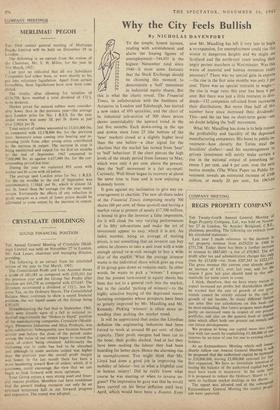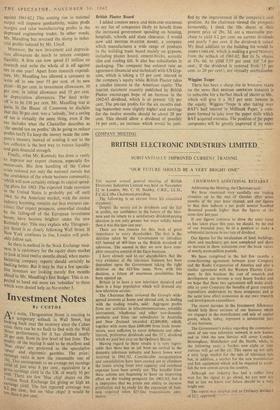Why the City Feels Bullish
By NICHOLAS DAVENPORT To the simple, honest layman, reading with astonishment and alarm the leaping figures of unemployment-544,451 is the highest November total since 1940—it must seem fantastic that the Stock Exchange should be choosing this moment to demonstrate a 'bull' movement
in industrial equity shares. But this is what the charts reveal. The Financial Times, in collaboration with the Institutes of Actuaries in London and Edinburgh, has started
a new index of 693 securities, and the chart of its industrial sub-section of 500 share prices shows unmistakably the upward trend in the
last five months. Each down-swing in the ups and downs since June 25 (the bottom of the `bear' market) closed at a slightly higher level than the one before—a clear signal for the chartists that the market has turned from 'bear' to 'bull' behaviour. If the chart pierces the high levels of the steady period from January to May, which were only 4 per cent. above the present, then the 'bull' movement is a fait accompli. Curiously, Wall Street began its recovery at about the same time in June and is now enjoying a Kennedy boom.
It goes against my inclination to give any en- couragement to chartists. The new all-share index of the Financial Times, comprising nearly 700 shares (60 per cent. of those quoted) and having a market value at present of nearly £17,500 million, is bound to give the investor a false impression, for it will cloak the very varying performances of its fifty sub-sections and make the art of investment appear so easy, which it is not. An index number, being an average of moving prices, is not something that an investor can buy unless he chooses to take a unit trust with a wide enough spread or is rich enough to buy a wide slice of the market.' What the average investor wants is the individual share which goes up even if its group goes down or remains static. In other words, he wants to pick a 'winner.' I suspect that the present turn-round in equity shares has been due not to a general rush into the market, but to the careful 'picking of winners'—to the highly selective buying of the depressed manu- facturing companies whose prospects have been so greatly improved by Mr. Maudling and Mr. Kennedy. Picking 'winners' is often more re- warding than picking the market trend.
It will be appreciated that under the Lloydian deflation the engineering industries had been forced to work at around 80 per cent. of their capacity. Their profit margins had been cut to the bone; their profits slashed. And at last they have been sacking the labour they had been hoarding for better days. Hence the alarming rise in unemployment. You might think that Mr. Lloyd had done a good job in improving the mobility of labour—but at what a frightful cost in human misery! Did he really know what course he was steering or when to reverse en- gines? The impression he gave was that he would have carried on his fierce deflation until next April, which would have been a disaster. Even now Mr. Maudling has Ieft it very late to begin a re-expansion, for unemployment could rise this winter to dangerous heights and we might see Scotland and the north-east coast sending their angry protest marchers to Westminster. Was this waste of material and human resources really necessary? There was no special gain in exports —the rise in the first nine months was only 3 per cent. There was no special restraint in wages— the rise in wage rates this year has been 4 per cent. But there was just a little restraint in divi- dends-132 companies refrained from increasing their distributions. But more than half of this number have since increased their dividends! This—and the tax ban on short-term gains—are no doubt helping the 'bull' movement.
What Mr. Maudling has done is to help restore the profitability and liquidity of the depressed manufacturing companies. His boost to public In- vestment—how cleverly the Tories steal the Socialists' clothes!—and his encouragement to private investment will surely make certain a rise in the national output of something be- tween 3 per cent. and 4 per cent. over the next twelve months. (The White Paper on Public In- vestment reveals an estimated increase of £340 million, or nearly 20 per cent., for 1963-64
against 1961-62.) This coming rise in national output will improve productivity, widen profit margins and raise manufacturing profits in the depressed engineering trades. In other words, Mr. Maudling has reversed the slump in indus- trial profits induced by Mr. Lloyd.
Moreover, the new investment and deprecia- tion allowances do much to restore company liquidity. A firm can now spend £1 million on research and write the whole of it off against tax in one year! Apart from research expendi- ture, Mr. Maudling has allowed a company to write off in one year 55 per cent. of its new plant-30 per cent. in investment allowances, 10 Per cent. in initial allowance and 15 per cent. in depreciation allowances. The final write- Off is to be 130 per cent. Mr. Maudling was at pains in the House of Commons to disclaim that this 30 per cent, was a 'subsidy,' but a saving of tax is virtually the same thing, even if the tax includes what the Chancellor describes as `the special tax on profits.' (Is he going to reduce profits tax?) To keep the money inside the com- pany's treasury instead of sending it out to the tax collector is the best way to restore liquidity and gain financial strength.
Finally, what Mr. Kennedy has done is vastly to improve our export chances, especially for motor-cars. His firm handling of the Cuban 'crisis restored not only the national morale but the confidence of the whole business community, which will now certainly enlarge its capital spend- ing plans for 1963. The expected trade recession in the United States is probably put off until 1964. So the American market, with the motor industry booming, remains our best overseas cus- tomer. Our export prospects, somewhat clouded by the falling-off of the European investment boom, have become brighter under the new Kennedy star. This may explain why Throgmor- ton Street is so closely following Wall Street. If New York continues to rise, London will prob- ably follow suit.
So there is method in the Stock Exchange mad- ness. It is customary for the equity share market to look at least twelve months ahead, when manu- facturing company reports • should certainly be looking better. But it may be that a few specula- tive investors are looking merely five months ahead to Mr. Maudling's first Budget. This is ex- pected to hand out more tax 'subsidies' to those which were denied help on November 5.







































 Previous page
Previous page